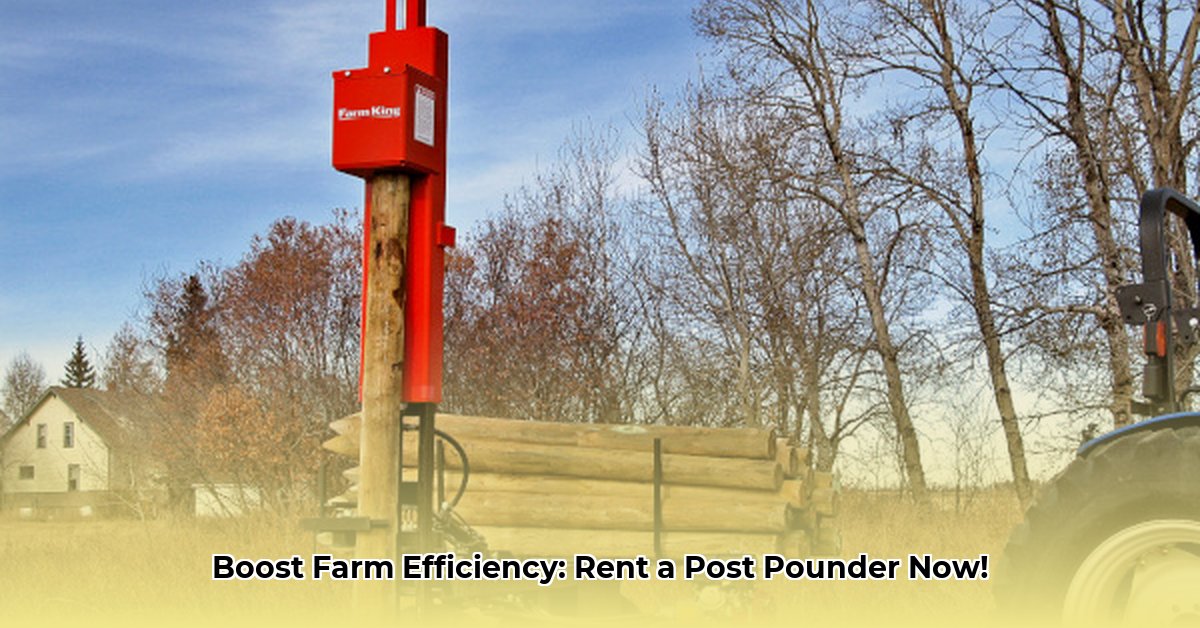
Tractor Post Pounder Rental: A Comprehensive Guide for Farmers
Thinking about building or repairing fences on your farm? Renting a tractor post pounder can significantly boost efficiency. This guide will walk you through everything you need to know, from choosing the right equipment to minimizing environmental impact. For more information on small tractor rentals, check out this helpful resource.
Why Rent a Tractor Post Pounder?
Purchasing a post pounder is a substantial investment. Rental offers flexibility and cost-effectiveness, especially for occasional projects or smaller farms. Renting allows you to allocate your budget to other essential farm needs. Is it more cost-effective to rent or buy? A cost-benefit analysis comparing purchase price, maintenance, storage, and depreciation against rental fees will determine what is best for your specific situation and project size.
Choosing the Right Post Pounder
Selecting the appropriate post pounder is crucial for efficiency and safety. Consider:
- Post Type: The type of posts (wood, metal) impacts the required power and equipment features.
- Soil Conditions: Rocky or clay soils necessitate more robust equipment than sandy soil.
- Project Scale: Larger projects require heavier-duty models to ensure timely completion.
Consult with a rental specialist to select the best post pounder for your specific needs and soil conditions. They can help avoid costly mistakes and ensure optimal performance.
Safety Precautions: Prioritizing Safe Operation
Post pounders are powerful machines; safety must be paramount. Always:
- Read the Operator's Manual: Thoroughly understand the equipment’s operation and safety features before use.
- Wear Protective Gear: Sturdy boots, gloves, and safety glasses are essential.
- Receive Proper Training: Seek training or instruction to ensure you know how to operate the equipment safely and efficiently. Improper operation can lead to accidents.
- Regular Inspections: Inspect the equipment before each use; report any damage to the rental provider immediately.
Prioritizing safety is not just about avoiding accidents. It also leads to more efficient work and higher-quality results. A well-informed and careful operator minimizes downtime and maximizes productivity.
Environmental Considerations: Sustainable Farming Practices
While post pounders increase efficiency, minimizing their environmental impact is crucial. Consider:
- Fuel Efficiency: Opt for fuel-efficient models or those running on alternative fuels (if available). Fuel consumption directly impacts your environmental footprint.
- Soil Compaction: Avoid excessive soil compaction during post driving, ensuring sustainable land usage. Strategies for minimizing compaction should be employed.
- Responsible Disposal: Dispose of any waste oil or other materials properly, following local regulations. This is a crucial aspect of responsible environmental stewardship.
"Choosing fuel-efficient models and minimizing soil compaction are critical aspects of sustainable farming," says Dr. Emily Carter, Agricultural Engineer, University of California, Davis. "These practices directly contribute to long-term land health and environmental preservation."
Cost Comparison: Rent vs. Buy
To determine whether renting or buying is more economical, compare the total cost of ownership (purchase price, maintenance, storage, depreciation) with rental fees for your project's duration. For infrequent use, renting is usually more economical. A detailed analysis considering your frequency of use is key.
Step-by-Step Guide to Renting a Post Pounder
- Assess Your Needs: Determine the project scope, post type, and soil conditions.
- Locate a Rental Provider: Research local equipment rental companies, comparing prices and available equipment.
- Inquire About Training: Ask about available training and instructions on operating the machine.
- Inspect the Equipment: Carefully examine the equipment for any pre-existing damage before signing the rental agreement.
- Review the Contract: Thoroughly read and understand all terms and conditions of the rental agreement.
- Operate Safely: Follow all safety precautions and instructions during operation.
- Return the Equipment: Return the equipment in the same condition as received, following the rental provider's instructions.
Pros and Cons of Renting a Tractor Post Pounder
| Feature | Advantages | Disadvantages |
|---|---|---|
| Cost | Lower upfront cost; reduced maintenance expenses; no depreciation. | Rental fees can accumulate for extensive projects. |
| Convenience | Easy access to powerful equipment; eliminates storage and maintenance needs. | Availability may be limited; dependence on the rental provider. |
| Flexibility | Rent only what you need, for the required duration. | Requires careful planning and scheduling. |
| Sustainability | Potential for fuel-efficient models; environmentally conscious choice. | Potential for higher fuel usage depending on equipment selection. |
By following this guide and making informed decisions, you can leverage the benefits of tractor post pounder rental, boosting farm efficiency while maintaining sustainable practices. Careful planning and safe operation are paramount for a successful project. Remember to factor in the environmental impact of your choices. Responsible farming is sustainable farming.